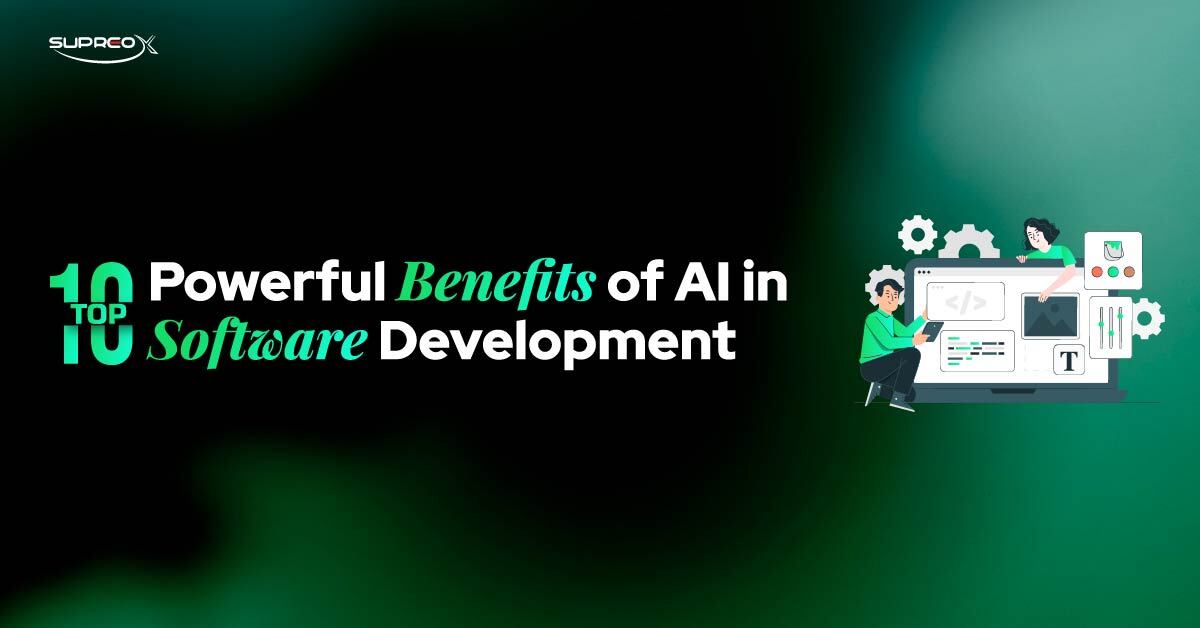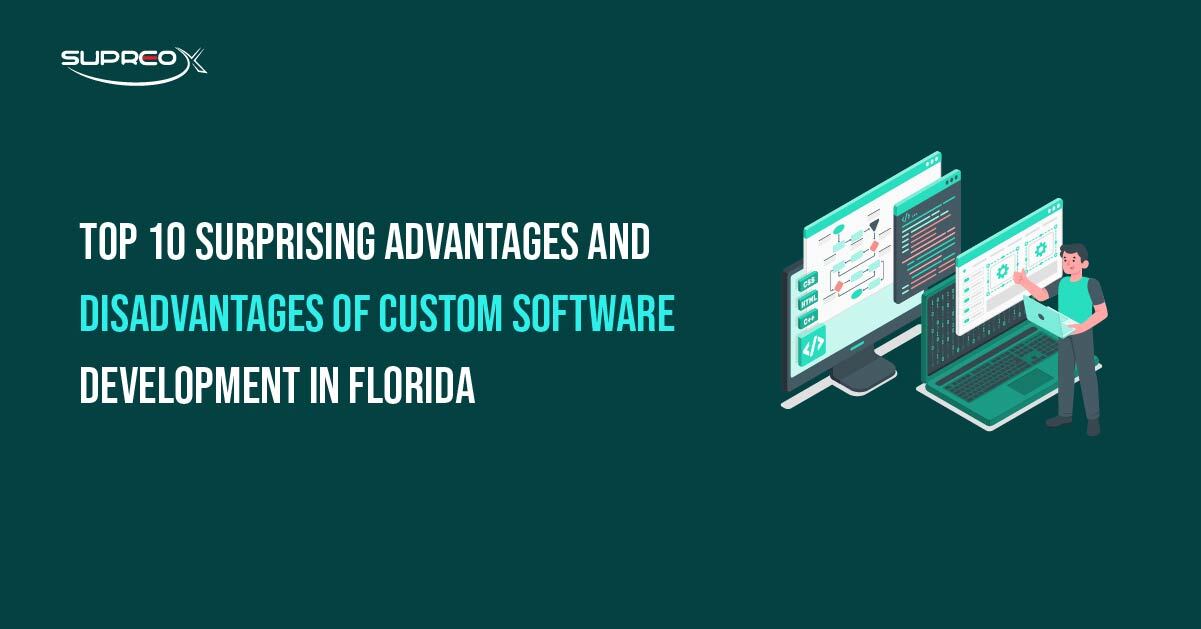AI brings a wide range of powerful advantages to software development, transforming how developers build, test, and maintain applications. It is expected that AI will automate 45% of software development tasks by 2030.
Let’s explore the top 10 benefits of using AI in software development that make coding faster, smarter, and more efficient than ever before.
Why AI Is Revolutionizing Software Development?
Artificial Intelligence (AI) transforms how software is built, tested, and delivered. With AI advancing at lightning speed, it’s no longer just a buzzword. Developers worldwide use AI to tackle complex coding challenges, speed up their workflows, and create smarter software. From machine learning to automation, AI is changing the game for software engineers by making development faster, more reliable, and more efficient.

What Is Artificial Intelligence in Software Development?
AI in software development means using intelligent systems to help create, test, and maintain software. It includes machine learning (ML), deep learning, natural language processing (NLP), and other smart technologies. These tools can write code, detect bugs, automate testing, and predict system failures. Imagine having a robot co-pilot helping you code. AI does just that and more. It is like having an extra team of supercharged developers on your side.
Top 10 Benefits of AI in Software Development

Let’s examine the top 10 benefits of AI in software development and see why every modern development team should pay attention.
Accelerated Development Cycles with AI Automation
One of AI’s biggest wins is faster development. AI tools can automate routine coding tasks, run tests, and even deploy updates without human intervention, drastically reducing development time.
Agile teams can deliver new features and fixes faster than ever. For example, AI-powered platforms like Jenkins and CircleCI streamline the CI/CD process, making continuous integration a breeze. When AI handles the boring stuff, developers get more time to focus on creative problem-solving.
Enhanced Code Quality and Error Reduction
Let’s face it, bugs are every developer’s nightmare. AI helps squash those bugs before they make it to production. Tools like DeepCode and SonarQube scan your code in real time, spotting errors and suggesting fixes. Based on historical data, AI models can predict where bugs will likely appear. This means fewer crashes, better app performance, and happier users. AI does not just catch mistakes. It learns from them to prevent future issues.
AI-Powered Software Testing and QA
Testing is crucial, but can be tedious. AI makes it smarter and faster. Automated testing tools like Testim and Selenium use AI to create test cases, run tests, and analyze results. AI can identify patterns and predict test outcomes, making QA processes more reliable. Plus, AI-powered testing reduces human error and speeds up the feedback loop, which means better software quality with less effort.
Smarter Code Generation and Completion
Ever wished your code could write itself? With AI, that dream is closer to reality. Tools like GitHub Copilot and Amazon CodeWhisperer use machine learning to suggest code snippets, auto-complete lines, and even generate entire functions. This speeds up coding and reduces the chance of syntax errors. It’s like having an expert programmer whispering in your ear, helping you write clean, efficient code.
Predictive Analytics for Better Project Planning
AI does not just help with coding. It also shines in project management. Predictive analytics tools analyze past projects to forecast timelines, budget needs, and potential risks. This helps teams plan better and avoid costly surprises. AI can even suggest resource allocation and workflow improvements. By making data-driven decisions, teams stay on track and deliver projects on time.
Improved DevOps and Continuous Integration with AI
DevOps and AI are a match made in tech heaven. AI enhances DevOps by automating infrastructure management, monitoring system health, and predicting failures before they happen. Continuous integration (CI) tools use AI to optimize build pipelines and reduce downtime. With AI in the loop, teams can deploy updates faster and more confidently. The result? Smoother operations and happier end-users.
Personalized User Experience through AI-Driven Insights
AI is not just for developers. It is also a game-changer for end-users. AI analyzes user behavior to deliver personalized experiences. For example, streaming apps recommend shows based on your watching habits, and e-commerce sites suggest products you will likely buy. Developers can use AI insights to tailor apps, making them more engaging and user-friendly. Happy users mean loyal customers.
Advanced Security and Risk Management
Cybersecurity is a growing concern, and AI is stepping up to help. AI-powered tools like Darktrace and IBM Watson detect unusual patterns and flag potential threats in real time. AI can spot vulnerabilities, predict attacks, and even automate breach responses. This proactive approach keeps software secure and protects sensitive data. With AI guarding your code, you can sleep easier at night.
Cost Savings and Resource Optimization
AI helps teams do more with less. It reduces development costs by automating tasks, reducing errors, and optimizing workflows. Companies also save money on manual labor, bug fixes, and system downtimes. Plus, AI’s efficiency means projects are completed faster, reducing time to market. The bottom line? AI boosts your budget and maximizes your resources.
Future-Proofing Software Development with AI Innovations
AI is not just a trend; AI in software development is the future. New AI innovations like low-code/no-code platforms, cognitive computing, and self-healing systems are reshaping software development. These tools allow even non-programmers to build apps, expanding the developer community. Staying updated with AI trends ensures your team remains competitive and ready for the next big thing.
Challenges and Considerations When Using AI in Software Development

While AI offers massive benefits, it is not without challenges. Data privacy is a big concern because AI relies on large datasets. Bias in AI models can also lead to unfair outcomes. Plus, there is the risk of over-reliance on automation, which might reduce human oversight. Teams need to strike a balance by leveraging AI’s strengths while staying aware of its limitations. Responsible AI use is key to long-term success.
Conclusion: Embracing the AI Revolution in Software Development
AI is transforming software development, offering speed, precision, and innovation like never before. From automating tedious tasks to enhancing code quality and security, AI is the ultimate co-pilot for developers.
While challenges exist, the benefits far outweigh the risks. Embrace AI, developers, and companies to stay ahead of the curve, build better software, and delight users worldwide.
FAQs About the Benefits of AI in Software Development
How does AI improve software development productivity?
AI automates repetitive tasks, suggests code, and speeds up testing, helping developers focus on creative problem-solving.
Can AI completely replace human software developers?
AI assists developers but can’t replace human creativity, judgment, and problem-solving skills.
What are some popular AI tools for software development?
Top tools include GitHub Copilot, Amazon CodeWhisperer, SonarQube, Testim, Jenkins, and DeepCode.
How does AI enhance software security?
AI detects real-time threats, predicts vulnerabilities, and automates cyberattack responses, keeping software secure.
Are there risks to using AI in software development?
Risks include data privacy concerns, AI bias, and over-dependence on automation, which require careful management.










